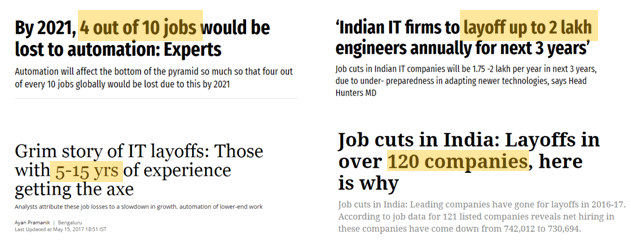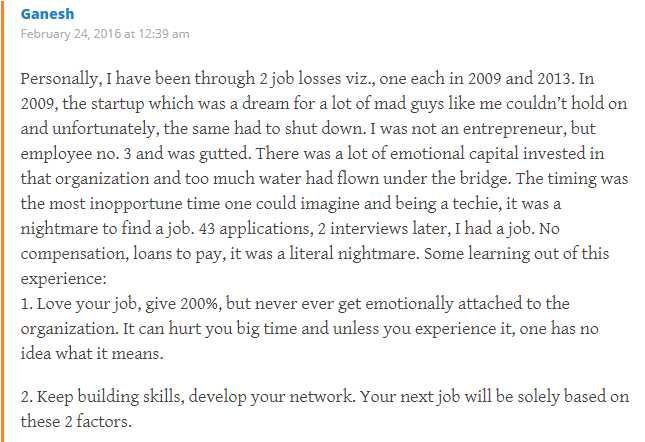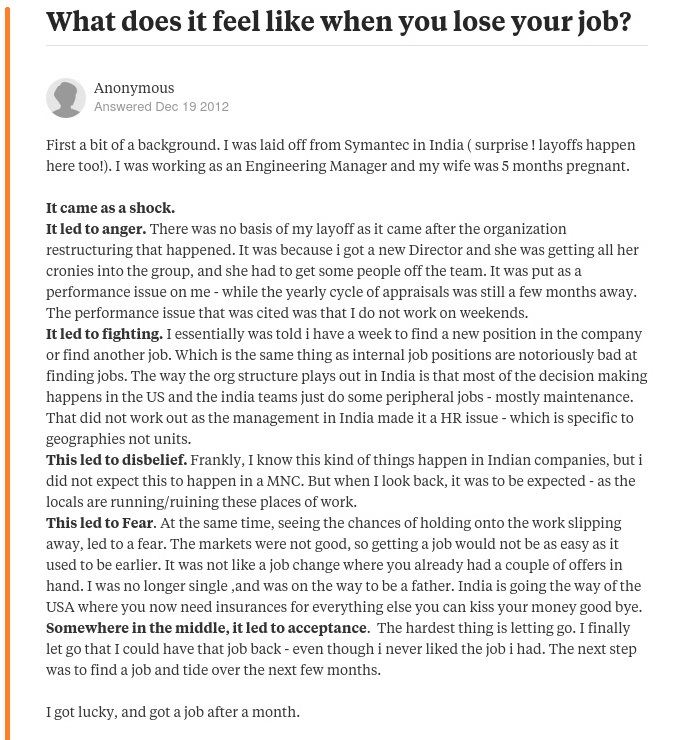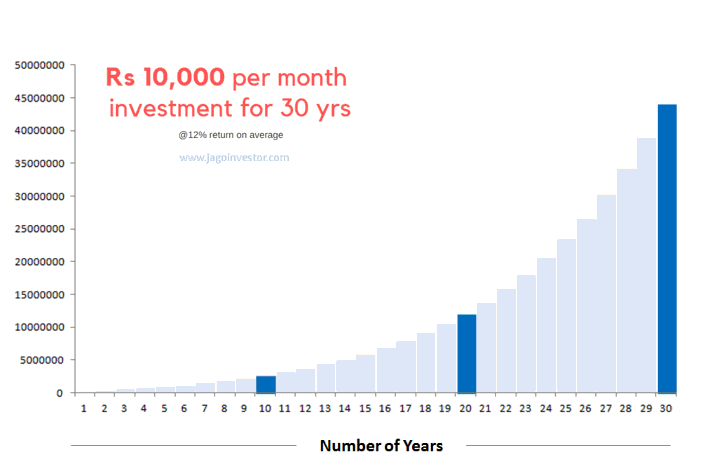Are you ready to deal with a job loss?
Job loss is a scary situation because it’s a big disruption in your life. If you lose your job, you need to suddenly look for another job quickly because you have to meet your household expenses and also deal with the emotional crisis.
In case of a layoff, you also lose self-confidence and start doubting yourself and keep wondering what the future is going to be now. Look at these news headlines which talk about so many job losses in India. While all the sectors have layoffs, these headlines are more from the IT sector.

Are you prepared enough for a job loss?
Have you ever thought about this situation? Have you ever visualized about losing the job?
We all are so confident subconsciously that something like a job loss is never going to happen with us. We hear that it has happened in someone else life, but we consider ourselves so lucky for no reason.
Our lives are smooth and our planning for the future is perfect, but it’s critical to check if you can take the bad news of job loss? Is your financial life strong enough to handle that situation?
Have you ever thought about this?
Have you ever thought about how you will be paying your EMI’s, your kid’s school fees, rent, various other household expenses and how you will deal with stress and the insecurity which will come with the job loss. If we pick the software industry, there is enough bad news coming in from the last many years.
The industry is going through tough times (and even good times) and it’s not very uncommon to hear that thousands of employees got a pink slip and lost their jobs!
If we talk about you, are you skilled enough to find a new job in the same industry with the same pay package? Can you afford a lower salary? Do you have enough savings to deal with the stress of living without a paycheck for the next 6 months?
I found some real-life experience of people who are sharing about their job loss and how they felt about it. Please read them to understand how it feels and what it means.
Story #1 – How Ganesh felt when he lost the job in a startup
Below is an experience of Mr. Ganesh who shares how he lost the job and had to face issues in his life.

Story #2 – How a software engineer felt after a job loss
Here is another experience of a quora user who worked for Symantec and lost a job when his wife was 5 months pregnant.

How to prepare for bad times?
We don’t wear a helmet while driving because we want the accident to happen. We wear it so to make sure we are protected if something goes bad accidentally.
In the same way, we should design our lives in such a way that even if we lose our jobs, the impact is limited and the emotional and financial loss is in control.
I know losing a job is not a great thing. Most of the wake up when they actually lose the job and start thing on what to do.
Don’t be that guy!
While you can’t stop someone from fire us, you always have control over what you can do to face that situation. So let’s talk about a few things you can and should do today to be ready for that scenario.
Action #1 – Have 6 months worth expenses in an emergency fund
When you lose the job, the immediate question which comes to your mind is – “How will I pay my bills?”
You have EMI’s, household expenses and many more things to deal with. You already know how messy it can get. I don’t want to get into details of it, but you need to pay all the bills. At best you will be able to stop a few things for a while, but how long?

You should have enough liquid money with you which can last for a few months. It’s like the emergency fuel (6-month expenses) you need in your car to reach the petrol station (new job).
One more reason why you need to have enough emergency funds with you is that it gives you more power to choose your next job.
If you do not have money at your end to last another month, you are too scared. It’s a panic situation which forces you to choose any job which comes next. It’s like being desperate for marriage and then saying YES to the first person you meet. Not a good thing for the long term.
Action for you: Just multiply your expenses by 6 and keep that amount invested somewhere which can be available at short notice (like few days). The focus has to be more on availability and not returns. You can choose a debt mutual fund or a simple fixed deposit for this.
Action #2 – Don’t have a neck to neck expenses
A good habit for any investor is to make sure that their income is 1.5 times of their expenses. You should not be living a life where every penny you earn is getting spent.
I know it’s easier said than done for many people, but at least start taking action towards this.
There are two benefits here.
Benefit #1 – You will have good surplus each month which you can invest in for the future. It keeps you worry-free and you also can save good amount.
Benefit #2 – When you lose your job someday, you at least have an option to take up a job that is paying you less. Imagine you are earning Rs 1 lac per month. In case your expenses are neck to neck, you will not be able to accept a job that is offering you Rs 80,000 a month. Can you?
I strongly suggest that your total expenses (including EMI and everything) should not cross 60% of your income. It’s a good habit to practice in your financial life.
Action for you: Find out the ratio between your income and expenses. How much are you saving each month right now? If it’s less than 40%, focus your energy on earning more income. If not immediately, give yourself 2-3 yrs of time when you will increase your income to the next level.
Action #3 – Be awesome in what you do
Don’t be mediocre in what you do. Don’t be average in what you do.
Are you a java developer? Then be the one who knows everything inside out and make sure you are among the top 5% in the entire world
Are you a marketing guy? Then make sure you are the one who can really transform the marketing of a company if you take that task in your hand.
Are you a chef? Then make sure you are worth inviting to master chef show!
Whatever you are doing right now in your life, just make sure you are ONE OF THE BEST.

I am not saying that you should do something extra ordinary in life, but whatever you are doing, strive to be one of the best in that field.
If you focus on this, then you probably will never lose your job. And even if you do, you will quickly get another, And if you don’t get another job quickly, you will at least be calmer and composed than others who know that it’s just a matter of time. Your panic level will be low.
Action for you: Make a list of things you need to do to go to the next level in your profession. List down which are the training you need to attend, list down which all certifications you need to complete. List down if you need to change your job to learn new skills? List down if you want to ask for help from someone more awesome than you. List down all the points and complete that in the next 12 months.
Action #4 – Start saving money and build a good portfolio
There is this concept of human capital and money capital.
Human capital is our ability to work and earn money, it’s about the potential and how much you will bring in the future.
Money capital is your portfolio which gets build over time, you keep earning money and save from it and start increasing your money capital.
When we start our career, we are high on human capital and zero on money capital. When we retire, we have money capital and very low human capital (maximum cases).
Start building a good portfolio
Focus on investing and saving money from a long term perspective. It’s better to lose a job with 50 lacs lying in your mutual funds and deposits in the bank. It’s a much better panic situation compared to just having some money in your bank account.
I know it’s very tough to have any portfolio at the start of the career but do whatever best you can do. Focus on creating your first 1 lac, then first 10 lacs, then first 50 lacs.
But at least take actions to reach there.
If you have good amount in your portfolio it feels safe. You can fall back on something which can last you for many years in the worst case. Imagine not having much in your portfolio and losing a job. Even Rs 10,000 invested per month can give you 25 lacs in 10 yrs if done in the proper way.

So ask yourself, if you have enough money capital as per your situation? Have you built and saved your money capital or not?
In the case of job loss, most of the people who are in extreme panic are those who have no sufficient money capital and human capital. Even if you save 10% of your money income on a consistent basis over your working life, it’s going to be a very huge amount. But most of the people even fail there.
Action for you: First slow down. Then see how much is your monthly surplus each month? Are you investing that money on a regular basis? If not, it’s time for you to start your SIP (our team will help you in building wealth in a systematic manner).
Don’t make these 5 mistakes at your work
Let’s quickly look at a few points which lead to a job loss. Many people just do wrong things at work and expect to never get fired. If the points below are true for you, its time you relook at your approach and take corrective steps.
- Not updated yourself as per job requirement – Are you still acting as if you are in 2007? Are you refusing to learn new skills that are required in your job? Are you into that comfort zone? If yes, it’s a signal that you may lose your job because you are getting stale day by day.
- Not able to work with others – Are you a team person? Any work is done by a group of people and not a single guy. Make sure you know how to have good relations with your teammates and work with others. If you are not a team guy, you might not be part of the team soon.
- Failure to do your work – This is a no brainer. Are you consistently failing in the work assigned to you? Are you not able to complete it in a given time and with the expected results? Get more trained, ask for help from others if that’s the case. It’s ok to fail once in a while, but if it’s happening very frequently you are on a list of non-performers and you might get a pink slip very soon.
- Failure to take initiative – Are you just doing what you are supposed to do? That’s all? Are you taking new initiatives yourself and showing that eagerness to go out of your way and surprise your employer? Remember, the pyramid is smaller at the top and you want to move to the top like many others. You will be the first tree to get cut if things get ugly.
- Failure to demonstrate productivity – Are you busy or productive? A lot of people do lots of things at work only to produce very little at the end of the day. Make sure you are doing more and highly useful productive work. Also, make sure you show that to your employer. Get it noticed and recorded.
I hope I was able to reignite your thoughts on these points. Do let me know how many marks out of 100 will you give to yourself on preparedness for job loss?
If you are 100% prepared and ready to cope up with it, you score 100/100, else 0/100 at the extreme end. I would like to hear about this from you and what you are going to do about it.
 October 9, 2017
October 9, 2017 
Good article !
But the most important mistake that leads to job loss has been left out & it is NOT buttering your supervisor !
If you are not capable of that, even God cant save you !!
Thanks for sharing. Is that your personal experience or everyone experience?
Manish
Excellent blog. Very useful for the people who are really facing this situation. Ideas given by you are practically helpful in their real life.
Thanks for your comment Anshul
Manish, my hands were itching to write some comments. Here are my observations and comments for readers.
1. IT gets captured in the headlines because of the large population of people working in the industry. However it is a fact in other industries as well, which does not get highlighted. So if anyone feels they are safe in a particular industry, please re-look.
2. The safest and the most risk free investment that one can do, is to invest in one-self. Learning and re-skilling is a key area everyone must focus on. You will have the highest risk free returns.
3. Try and generate a second income. Part time teaching, photography, writing, handicrafts, cooking, guest lectures, rental income….The list is endless. This is more important if your spouse is not working.
4. Start investing from as early as possible in your life.
5. Keep a PLAN B ready in case you get fired. In all of the ‘prison break’ movies that i have seen, the protagonist (hero) had a plan B.
6. Higher the age, the organisation you work for, feels, you are getting more useless. When cost cutting comes, they will generate a excel sheet with higher salaries on the top of the sheet. I have seen places where 10 people were forced to resign with salaries ‘greater than x’.
7. No one is indispensable. Do not feel that you are an ‘asset’ to an organisation. The organisation may not be considering you an asset.
8. “Comfort’ and ‘inability to change’ are two things we are very comfortable about. In the movie, ‘Shawshank redemption’, the protagonist talks about ‘getting institutionalized.’ Never get institutionalized.
9. I took a look at your ‘Do not make these 5 mistakes at work.’ Even if you consider that as a religion, there is no guarantee, that you will still not be fired.
10. Along with financial investing, investing time in kids and family will help. When your company is not there, and your salaries are not there, they will be. So, when it is time to enjoy with families, do so. I worked in a bank, where the manager used to ask us to come on Sunday’s. He ensured that we are ‘productive’ on a week end as well.
Thanks for these 10 great points .. Lots of learning in these 10 things itself ! 🙂 . Why dont you do a guest post from your side on these points ? I am serious !
Sure manish…why not…how many words do you want me to write…which email id should i send to….
Excellent Article Manish.
I am in the same situation like many but I have saved some money which I know will be helpful. I am not happy in my current job and I know I will get a pink slip soon because there is something happening in the company like politics. Which I don’t like. I am afraid with the current situation of the market where there are very less jobs for people with more experience. So my question to people on this board is will companies like to take people after a break?
Ideally NO .
If there is a break, they get suspicious and ask too many questions … But its not that you cant find a job at all. There are employers who value your talent and ability more than anything !
Thanks Manish,
Wonderful and timely article!
I had always prepared for a job loss, with alternate sources of income. But turns out getting laid off is higher, due to invested ’emotional capital’.
Anyway, years of investing and living-below-my-means caused a decent amount of financial assets to accumulate. In another article you had suggested that I can look at 12% average growth in equity over multiple years – if that turns to be true for the future then I have a good source of income.
One interesting insight – “Jobs are a recent creation (last 50- 60 years), most of our grandfather probably didn’t have jobs and were farmers or lay craftsmen/ traders. It is not “necessary” that the phenomenon of Jobs would continue in the future”
Thanks for sharing this point – “Jobs are a recent creation (last 50- 60 years), most of our grandfather probably didn’t have jobs and were farmers or lay craftsmen/ traders. It is not “necessary” that the phenomenon of Jobs would continue in the future”
I agree to that .. Thanks for sharing your comment on this topic !
I would like to add my experience with the job loss, twice in 2015 and 2016, back to back in a single year.
I must say this from my experience, saving and investing for the longer term is the only thing that can let you survive these tough times. As many times Manish and other people on Jagoinvestor have emphasized, saving a large part of your income would be the only survival mantra here. Though I have saved almost 60% of my income in last 3 years, I regret wasting 5 early years of my income were lost to stupid lifestyle choices. I would beg to request,
– Create an emergency fund of 6-12 months expenses and put in FD.
– Invest rest of the savings in Equity Mutual Funds, or Stocks if you are skilled enough in the stock markets.
– Buy term life insurances.
– Encourage your spouse to work or help him/her get trained for a job. 2 income streams in a house are better than 1.
– Keep reading Jagoinvestor and other such nice blogs for encouragement.
Thanks for sharing these points ! … Great !
It’s very helpful article for me because presently I am facing this situation… Working in oil and gas sector in middle East.
I think instead of focus on job better to start a small business.
Hey Dinesh
Glad to know that you liked the article.
Please share it on your social media profile so that it can reach more and more people !
Manish
Excellent article Manish. I want to start off by saying that I was really inspired by that one article of yours where you wrote your experience about how you quit your job at Yahoo and finally decided to follow your dream against all odds and opposition. Ever since the day I read that, I knew I had to get started on my dream and drew up an action plan to free myself from this IT job which I considered as nothing more than slavery from Day 1. So last month, I successfully quit my job at the age of 27.
I was always very frugal by nature even from back in my college days when I used to do odd online jobs that didn’t pay much but I ensured I saved every penny I possibly could. I built up a sizeable savings which netted me a few thousands rupees as interest every month. I guess that habit carried over to my professional life when I got a job. I started saving almost 95-98% of my monthly income and managed my expenses as much as possible from the interest income. My salary was a meagre 35k, so it wasn’t easy but where there is a will, there is a way.
So after working 5 years during which I cursed my company and boss every single day, I finally had enough of the BS and dropped the resignation notice on them out of the blue. I got the top most rating in 4 out of 5 years of my stay there. So they were surprised by my decision especially at a time when media is reporting massive job cuts in IT due to US Visa issues and automation. Having to do 12 hours of boring donkey work everyday, having to work on weekends/holidays thanks to impossibly tight deadlines without any extra pay, having to beg for 5 days leave to go on a vacation once a year, having to tolerate their politics and favoritism which denied me opportunities I deserved was killing my soul from within and I was dying a little with every passing day. Even on holidays/vacation, there was an expectation to be available on phone for support.
I just knew life couldn’t go like this forever. So I made plans to become self-employed late last year. I started acquiring new skillsets through sleepless nights and sheer hard work to switch over to freelancing with the aim to open a small business a few years later. Once I felt ready and confident, I quit. After being self-employed for just over a month, it feels amazing. It’s hard work without a doubt and there have been many sleepless night to deliver projects on time but the sense of freedom is just indescribable. There is truly something to be said for working for yourself. The best thing is my salary is not fixed anymore. The harder I work, the more I earn, so there is an incentive to work hard and increase income.
Thanks to my frugal nature, I saved up enough money during my employment to last many years even if I stop working today. I plan to increase my savings to an amount that would last a lifetime by the time I reach 30. So a few years of sheer hard work is ahead of me but for now, I am enjoying my new found freedom even though I am working super hard.
Thats an amazing sharing Anjan. Its quite an achievement that you left your job at the age of 27. I think its the age where its EITHER NOW OR NEVER !
I am quite inspired by your story and it needs to be shared by more and more people. I will mail you separately for that
Manish
Exactly, Manish! Age is an important factor. I have reached an age where I knew my parents would start badgering me for marriage within the next couple of years. So I knew its now or never. I had to act and I knew I had to stick to my plan no matter what may come or else it will be too late.
The fact that I love to travel was perhaps my biggest motivation to become self-employed as employers would never give you more than 5 days leave even if you beg. I am the kind of guy who loves to go on month long tours.
Wonderful ..
Travel industry is booming and in times to come its going to be a wonderful profession .. I strongly suggest that you should atleast start a travel blog for now to start with .. !
Also, please check my mail and reply
Manish
Just to add another point, while in job make sure we are giving interviews every year to see how employable are we.
keep updating the skill and invest in yourself by getting upgraded with latest technologies in the area we all are working.
Pushing ourselves from our comfort zone is the key.
Extremelly great point !
I have faced a situation like this in the past and executed some of the suggested action (NOT ALL).
Believe me they are extremely helpful in saving your boat in tsunami.
Thank you JAGOINVESTOR for such a nice suggestions, I will add all actions in my basket now.
Thanks for your comment 🙂
Hi Manish,
Very apt article…I lost my job last year in the oil crisis..was working in middle east in the oil and gas field as Engineer for 13 years and prior to that 10 years in India in Govt company..luckily my passive income (rents,dividends) equals my current expenses,,and my portfolio income (Market gain,booked and unbooked, FDs, Bonds,,)equals my last drawn annual salary…so I FIREd at age 47.. and.kicked back….Two school going kids and now settled in Pune..nice weather..All this was possible as I saved 85 % of my salary for the last 13 years..
Even in my One year after Job loss I am able to save 85 % of my all passive and portfolio income combined…Thanks to Mr Market Obviously as I dont have cushion of salary anymore..
My advice to young folks .,,save as if there is no tomorrow…( literally) and invest,,,live below your means,, These are trying times…
All the best..
Wonderful sharing from your side Mr. Sathe !
Glad to hear about you and what you achieved !
Manish
Excellent article. Very useful for the people who are really facing this situation. Ideas given by you are practically helpful in their real life.
Thanks !
Hi Manish,
Excellent article as always.
I also feel that – in addition to all the above – it is very important to have a second/passive income.
People should actively try to create such an income, start small, and over the years it may bring in as much income as ones salary.
It is a very comfortable place to be, although very hard to implement 🙂
Regards
Sanket
Yes, very true ..
THis is what separates Great investors from average people . I know its not that easy, but something everyone should strive for !
Very aptly said, Manish.
I think one should have second source of income along with the primary job. I know it is not easy, but atleast one should try for this.
I think I am at level 70 currently. So, I have to be quick leraner in upcoming days to increase my skills set.
Great to know that 🙂 ..
Security is a illusion, most people assume they are secure in a job, they have done for long time, gone are the single skill days, soon bots will take most jobs, with a universal basic income and impossibility in India the only ways are invest, reskill, become a life long learner, high adaptability, debt reduction, living on less are key skill IT sector needs to learn in India. We have learned consumerism and accepted debt as a acceptable std, like the west, then the impact of job loss, will lead to hopelessness.
Hi Viswa
Thanks for your sharing your valuable comment on this topic. Please keep sharing your views in future also
Manish
Thanks for the Alarm. Sometimes preferred returns with little leverage over Emergency Fund. But this alarmed to put back Emergency to perspective and not leverage in any case. Thanks .
Hi Lakshmipathy
Thanks for your sharing your valuable comment on this topic. Please keep sharing your views in future also
Manish
Excellent & thought provoking article Manish
Thanks .. Please share your thoughts about these points !